- Home
- Jack Campbell
Vanguard Page 15
Vanguard Read online
Page 15
Straightening a little more and crossing her arms as she met his eyes, Mele shook her head. “Not that it’s any of your business, but no. Did you?”
Odom’s glower increased, but if he planned on saying anything else, he was cut off by Council Member Leigh Camagan. “What was your specialty as a Marine?”
“We were a pretty small organization,” Mele said, forcing herself to relax, “so we didn’t specialize much. I trained for ground and space assault, force reconnaissance, special missions, whatever was needed.”
“I see. Then this situation falls within your training and experience? What would your advice to the council be?”
Mele looked around at the thousands present and the screens showing tile images of thousands more. “Um . . . my advice would be to offer my advice in a less public setting. No sense in tipping off those Scatha guys about what might happen.”
She sat back down while everyone debated about that. Half of the people at the meeting seemed to think that she could single-handedly defeat the Scatha forces on the ground, and the other half seemed to believe that Mele intended a nefarious plot to subvert the government of Glenlyon. She wasn’t sure whether to be annoyed or flattered at the widespread belief in her abilities, a belief that hadn’t been shared all that much with the superiors writing her performance evaluations back in Franklin.
Why had she even gotten involved? Why not beg off and walk away? Glenlyon had one small warship and nothing in the way of ground forces to deal with another star system that was far better equipped and organized for fighting. This looked like a hopeless cause.
But Mele stayed in her seat, waiting.
She had always been sympathetic to hopeless causes and had always wondered whether she could win a hopeless fight. Maybe it was time to find out.
Chapter 7
Eventually, the people and their representatives got tired of debating and discussing. Various council members gave heartfelt speeches promising to protect the colony no matter what sacrifices had to be demanded of someone else. Mele found herself being escorted by a couple of police officers through the crowds leaving the amphitheater and to a newly constructed office along with Council Members Chisholm, Kim, Odom, and Camagan.
Inside the office, a display on one wall showed that Lieutenant Geary was also part of the meeting. Mele eyed him warily, grateful for the chance to get more of a feel for what Geary was like. Her experiences with officers had not always been positive ones.
A frazzled-looking Council President Chisholm sat down at the big desk in the room, rubbing her temples. “That was interesting.” She turned to Mele. “Now, we would like to hear your recommendations.”
Mele nodded to her, then to the others, shifting to an attention posture without even realizing it before she spoke. “You’ve got three options, as I see it. One is to do nothing, to just accept that Scatha is going to take over that continent piece by piece, but I don’t have the impression anyone here wants to do that.
“A second option is to improvise whatever weaponry you can and hit them with as many people as you can at once. You’ve got thousands of people in the colony, so if enough could be persuaded to join, you could overwhelm even a force of a hundred soldiers that way. That would solve the problem pretty fast, but it would likely be a really expensive option.”
“By expensive,” Odom said, his voice heavy, “you mean in terms of lives?”
“Yes, sir. At least a few hundred dead. I don’t recommend doing that.”
“I’m happy to hear it,” Odom replied, sounding sarcastic.
“The third option,” Mele said, “which is what I’d recommend, is to get together a smaller force of volunteers, take enough time to train them and manufacture at least a few military-grade weapons, then stage a raid to take out that antiorbital cannon and any other installations or equipment we could manage. After one raid they’d probably jack up their security, so after that it’d be a matter of wearing them down by picking off Scatha patrols or individual soldiers. If you put enough pressure on them, they could crack before reinforcements arrive.”
“Reinforcements?” Chisholm demanded.
“Sure,” Mele said. “No way Scatha will just leave that small a colony there. They’ll grow it, add more defenses, get dug in.”
“They’re going to try to control that entire continent,” Leigh Camagan said.
“If we plant another city to block their expansion—” Odom began.
“We can’t,” Chisholm broke in. “We don’t have enough people or equipment to split off a new city already. Anything we put out there would be small, isolated, and in danger from those soldiers!”
“I agree with that,” Mele said.
“You said you needed enough time,” Kim said to Mele. “How long is that?”
“A few weeks, at least, depending on the quality and experience of the volunteers. It would still be risky, but if you knew what you were doing it would be the least risky defensive move. A few weeks isn’t enough time for any help to arrive, if you send for it, but it could prepare the ground for when you have more capability.”
“We are going to ask nearby star systems for help,” Chisholm said. “Did you gain any knowledge of their military forces while coming here?”
“Not much, no,” Mele admitted. “Most of them seemed like you.” She didn’t go into detail, not wanting to rub in their lack of resources against aggression.
“Kosatka,” Kim said. “That’s only two jumps away from us. And they’ve been established longer. If there is any star system nearby that could help, it would be Kosatka.”
Mele saw the council members turn to look at the image of Lieutenant Geary.
“We would have to send you,” Chisholm said. “You are our only space defense, but we have no other ship available. How long would a trip to Kosatka and back require?”
Lieutenant Geary looked toward something to one side of him. “At least three weeks,” he said, “counting time spent traveling to and from jump points. More likely a full month given the problems we still have with the power core on the Squall. We can’t afford to push it hard the whole way.”
“Why would Kosatka help us?” Odom asked.
“With Scatha being this aggressive against us,” Leigh Camagan said, “they might have pushed at Kosatka as well.”
“Yes,” Kim said, nodding vigorously. “Even if they haven’t been directly attacked by Scatha, they must know what’s happening. If Scatha gets strong enough, someday it will threaten Kosatka, too. But we can’t just let Scatha keep building here for the months required for us to get military equipment from Kosatka. Assuming Kosatka does help, which is not something we can be sure of. And does Kosatka even have any military equipment? We must go with the proposed option three!”
Leigh Camagan eyed Mele. “Perhaps we should pursue option three and send for help. Put together a small force to wear at Scatha’s presence on our world, while we also send for more means to combat them. You’re a former Marine. Would you be willing to train and lead such a force?”
“We know nothing about her!” Odom protested. “Except what she has told us!”
“It will be easy enough to test her knowledge and abilities,” Kim said.
“But why should she be counted on to defend Glenlyon?”
They all looked at her, expecting an answer. Mele had to think about the question before she replied. Why did she care about Glenlyon? “You people seem to be like my kind of people. Not looking for a fight but willing to defend yourselves if someone else pushes you. Scatha seems to be the bully in the neighborhood. If I saw a bully giving people trouble, I’d help.”
“What was your highest rank in the Marines?” Chisholm asked.
Mele shrugged slightly. “I was a sergeant for a few weeks.”
“A few weeks? What happened?”
“I had a disagreement with an officer
about faking data on a unit readiness report. She got busted afterward for ordering me to fake the data, and I got busted for using disrespectful language when I refused.”
“I see.” Chisholm looked at the others.
Leigh Camagan picked up the questioning. “Is that why you left Franklin’s armed forces?”
Mele shook her head. “Not entirely. There were some other violations of good order and discipline. Just minor stuff. But because of them, when the force downsized, my name popped up as a good candidate.”
“Why should we trust you with this job?” Odom asked in a sharp voice. “How can we be sure you’ll be able to do it?”
“First of all,” Mele said, “I haven’t said I’ll do it. I was just a grunt. Not an officer. I haven’t led or organized anything like what you need.”
Leigh Camagan gave Mele an arch look. “Are you saying that you, a Marine, are not capable of doing this? That it is beyond your ability?”
Mele grinned at her. “You’re good.”
“I know. What’s your answer?”
“If you put it like that, I’m willing to give it a shot.”
“You still haven’t told us why you should be offered the job,” Odom said.
“It’s not like I volunteered for this,” Mele said. “I said I’d offer you what advice I could, and I did that. You guys are pushing me to volunteer to do more. It wasn’t my idea.”
“She’s all we’ve got,” Kim said.
“That’s a good reason,” Mele agreed. “I’ll tell you this. I don’t screw up on important things. I never have and never will. When lives are on the line, I do things right.”
“You feel a sense of responsibility?” Leigh Camagan asked.
“I don’t let down people who are depending on me,” Mele said.
“Why should we believe you?” Odom pressed.
Leigh Camagan gestured toward Mele as she answered him. “Because she refused an order to fake data on a report. Because she told us she was only a sergeant for a few weeks. Because she admitted to other minor indiscretions. She didn’t try to paint a perfect picture of herself or withhold information that we wouldn’t have been aware of if she hadn’t told us. She’s been honest, which I think is the most important quality we can ask for.”
“She is our only trained and experienced option,” Kim said.
“Lieutenant Geary,” Leigh Camagan said, “what is your judgment regarding Mele Darcy?”
Mele didn’t think Lieutenant Geary looked happy at being called on. “I don’t know her any better than the rest of you. But in terms of her attitude, she strikes me as a professional. And the way she carries herself is a sign that she does know what she’s doing.”
“Do you trust her?” Odom asked.
Lieutenant Rob Geary looked Mele in the eyes. She met his gaze calmly.
He nodded. “Yes.”
Council President Chisholm exhaled heavily. “Then that is decided. We will speak to the rest of the council and work out an appropriate loyalty oath and contract for you, Mele Darcy. I am sure the council will accept our recommendations regarding you.”
“So, what am I going to be?” Mele asked.
Leigh Camagan smiled crookedly at her. “You will be the commander, and at the moment the entire force, of the consolidated Glenlyon Marines and Ground Forces. Consider yourself to be once again a sergeant until informed otherwise.”
“How are we going to pay for this?” Council President Chisholm asked.
“We’ll have to take money intended for other purposes,” Leigh Camagan said. “And try to raise some more without harming the growth of the colony’s economy.”
“This does not need to be discussed in her presence,” Odom said, gesturing toward Mele.
“Can you give us an estimate of what you’ll need to train a force and deal with that antiorbital weapon?” Leigh Camagan asked Mele. “Just something rough, so we know what we’ll be dealing with.”
“How big a force am I going to be authorized to recruit?” Mele asked.
“How many do you need?” Kim asked her. “And what equipment?”
Three hundred, she wanted to say. But that would be ridiculous. How could she train that many people? Just organizing them would take weeks. “Fifty people. I’m assuming at least some of those won’t work out. For equipment, I’ll take whatever you can get me.”
“Good,” Leigh Camagan said. “Lieutenant Geary will be leaving orbit about this planet soon. Please coordinate with him before then on any matters that need . . . coordination.”
“Yes, ma’am.” The moment seemed to call for a salute, so even though Mele wasn’t in uniform (uniforms—she’d need to do something about those, too) she raised her right hand in a firm salute to the council members. Pivoting smartly on one heel, she marched out of the office, wondering just what the hell she had gotten herself into this time.
Mele hoped that Lochan Nakamura was doing a better job of staying out of trouble than she was.
• • •
Even though there wasn’t a spark of romance between them, Carmen Ochoa and Lochan Nakamura had fallen into the habit of eating most meals together. She wondered how long that little ritual would survive once they arrived at Kosatka and how much of the irritability she was feeling was attributable to having been in jump space for days as opposed to being nervous about what she needed to say. “Lochan, we’re going to reach Kosatka tomorrow. There’s something you need to know about me before then.”
He raised an inquisitive eyebrow at her as he took a drink. “From that solemn voice and look, it’s something bad, which I find hard to believe. Are you going to tell me you really are a lawyer?”
That made her smile briefly despite her mood. “There are worse things than lawyers. Lochan, I’m a Red.”
“A what?”
“You really don’t know? Back on Earth, in the entire solar system, anyone from Mars is called a Red.”
Lochan frowned at her and put down his fork. “The way you said that made it sound like an insult.”
“It is. You’ve really never heard the term?” She didn’t know whether to feel relieved or upset at the need to explain. “How much do you know about Mars?” Carmen asked.
“Um . . . not much,” he admitted. “First new world ever colonized by humans, right? And, uh, independent?”
“Independent to a fault,” she told him. “Mars was cursed by being close enough to Earth and close enough to being like Earth. When long-range spaceflight within the solar system became practical and cheap enough for colonization of other worlds to be feasible, the human presence on Mars grew like crazy as lots of governments and private companies and private groups planted their own little colonies in attempts to lay claim to parts of the planet and its resources, or just to claim their own independence from everybody else. Dozens of colonies, from large settlements to small groups. As the little colonies grew into cities, they stayed independent of each other, distrusting and disliking everyone else. The only time they have ever come together to cooperate in a common cause was for MAWFI.”
“Maw-fee?” Lochan Nakamura asked.
“Sorry. That’s how Reds say Martian War For Independence.”
“Oh. And you are . . . okay.” Lochan looked puzzled. “Who were they getting independence from?”
Carmen sighed. “The truth is that MAWFI was all about getting rid of the off-planet sources of law and order. Earth gov peacekeepers, law-enforcement and customs authorities, and tax collectors where those still functioned. But the average Red, to the extent that there is an average Red, got fooled into thinking that getting rid of those kinds of people would solve all of their problems. In reality, all it did was give the strong-arm rulers total freedom to do whatever they wanted. A lot of the heroes of MAWFI died soon afterward because the bosses didn’t want them causing problems.”
Loch
an Nakamura’s gaze on her was troubled. “An idealist is a person who helps other people to be prosperous,” he quoted. “Some rich guy said that centuries ago.”
“I’m an idealist,” Carmen told him. “I think we can make things better.”
“Yeah, but I’ve talked to you enough to know your idealism is grounded in reality,” Lochan objected. “Instead of rejecting reality because it produces problems for your idealism, you believe that there are realistic ways to fix things for the better. So Mars is full of lots of different places that don’t get along. What does that have to do with your not wanting people to know you’re a, uh, Red?”
“I told you,” Carmen said. “There’s no central government, not even any strong regional governments. And all of the places that got set up by idealists who were going to establish little utopias sooner or later got taken over by bosses who were brutal realists. There is no overriding law on Mars. Most of the city-states are effectively controlled by kleptocracies, oligarchies, plutocracies, or red-dust dictators. Everyone else just tries to survive. And everywhere else in the solar system, anyone who sees a Red worries that they are a thief, a murderer, a con artist, or a beggar looking for handouts.”
This time Lochan Nakamura’s frown reflected distress. “It’s still like that? People call you Reds, but they don’t try to help?”
Carmen almost laughed in scorn. “No. And I don’t blame them. No one on Mars is powerful enough to change it, and no one outside Mars wants to get sucked into the tar pit that trying to pacify Mars would become.” Carmen blinked as memories flooded her. “Lochan, most areas are controlled by what amount to gangs. They may officially be called militias or neighborhood watches or something else, but they’re gangs. Mars took all of the idealism that Earth sent it and reforged it into cynicism and a survival-of-the-fittest mentality that forces everyone to do whatever they must.”
“You’re not like that,” Lochan objected.
“I was until I got off the planet,” Carmen said. “I had to survive, and get an education, and one way or another earn enough money to bribe the right people to get approved for immigration to Earth. I’m not proud of it, Lochan, but I left it behind. No, that’s not true. It still stains me in the eyes of anyone from Earth. If they learn I grew up on Mars, they are going to see me as a Red. A criminal. Not to be trusted or believed.”

 Ascendant
Ascendant Leviathan
Leviathan Fearless
Fearless Shattered Spear
Shattered Spear The Pirates of Pacta Servanda
The Pirates of Pacta Servanda The Sister Paradox
The Sister Paradox The Last Full Measure
The Last Full Measure The Dragons of Dorcastle
The Dragons of Dorcastle Dreadnaught
Dreadnaught Swords and Saddles
Swords and Saddles The Hidden Masters of Marandur
The Hidden Masters of Marandur Relentless
Relentless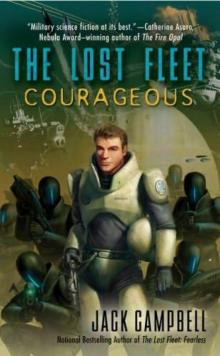 Courageous
Courageous Ad Astra
Ad Astra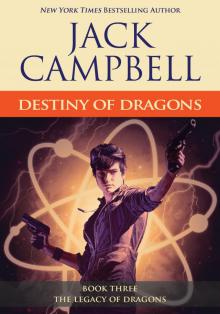 Destiny of Dragons
Destiny of Dragons Borrowed Time
Borrowed Time Dauntless
Dauntless Blood of Dragons
Blood of Dragons Perilous Shield
Perilous Shield The Assassins of Altis
The Assassins of Altis Vanguard
Vanguard Pirate of the Prophecy
Pirate of the Prophecy Imperfect Sword
Imperfect Sword Boundless
Boundless Triumphant
Triumphant Tarnished Knight
Tarnished Knight Daughter of Dragons
Daughter of Dragons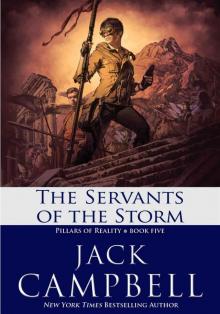 The Servants of the Storm
The Servants of the Storm Steadfast
Steadfast Fate of the Free Lands
Fate of the Free Lands Explorer of the Endless Sea
Explorer of the Endless Sea Triumphant (Genesis Fleet, The)
Triumphant (Genesis Fleet, The) The Lost Fleet: Beyond the Frontier: Steadfast
The Lost Fleet: Beyond the Frontier: Steadfast The Lost Fleet: Beyond the Frontier: Leviathan
The Lost Fleet: Beyond the Frontier: Leviathan The Lost Stars: Imperfect Sword
The Lost Stars: Imperfect Sword Dreadnaught tlfbtf-1
Dreadnaught tlfbtf-1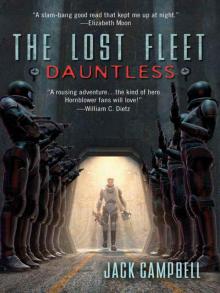 The Lost Fleet: Dauntless
The Lost Fleet: Dauntless Relentless tlf-5
Relentless tlf-5 Lost Fleet 2 - Fearless
Lost Fleet 2 - Fearless Victorious tlf-6
Victorious tlf-6 Dauntless tlf-1
Dauntless tlf-1 The Pirates of Pacta Servanda (Pillars of Reality Book 4)
The Pirates of Pacta Servanda (Pillars of Reality Book 4) Fearless tlf-2
Fearless tlf-2 The Lost Stars: Perilous Shield tls-2
The Lost Stars: Perilous Shield tls-2 Lost Fleet 5 - Relentless
Lost Fleet 5 - Relentless Lost Fleet 6 - Victorious
Lost Fleet 6 - Victorious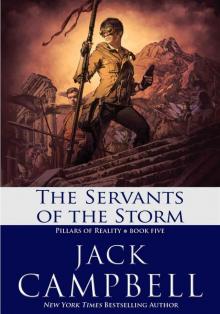 Pillars of Reality 5- The Servants of the Storm
Pillars of Reality 5- The Servants of the Storm The Lost Fleet: Beyond the Frontier: Guardian
The Lost Fleet: Beyond the Frontier: Guardian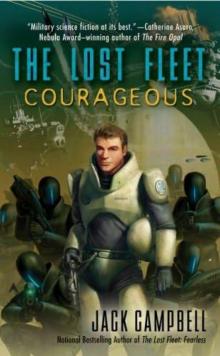 Lost Fleet 3 -Courageous
Lost Fleet 3 -Courageous The Lost Stars: Tarnished Knight
The Lost Stars: Tarnished Knight Beyond the Frontier: Steadfast
Beyond the Frontier: Steadfast Courageous tlf-3
Courageous tlf-3 Lost Fleet 1 - Dauntless
Lost Fleet 1 - Dauntless The Lost Stars
The Lost Stars The Lost Fleet: Beyond the Frontier: Dreadnaught
The Lost Fleet: Beyond the Frontier: Dreadnaught The Lost Stars 01-Tarnished Knight
The Lost Stars 01-Tarnished Knight Valiant tlf-4
Valiant tlf-4 The Wrath of the Great Guilds (The Pillars of Reality Book 6)
The Wrath of the Great Guilds (The Pillars of Reality Book 6)